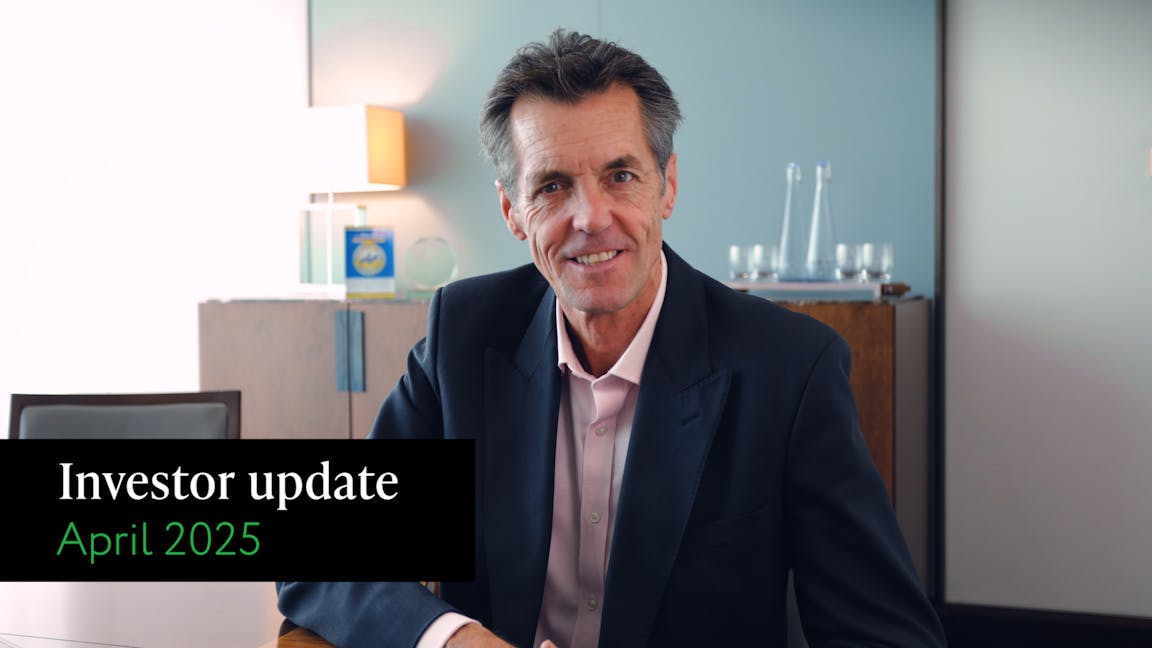
Market events have prompted us to break from the norm in this month's investor update. Brad Holland, Director of Investment Strategy, explains why markets have been especially turbulent since the start of April, and what it means for Nutmeg investors.
Normally our investor updates focus on just the previous calendar month, but so much has happened since the end of March we have taken a slightly different approach this time.
Investors have been unsettled for some weeks, which has been reflected in recent market volatility. This has been due in large part to the Republican administration making continued threats to implement sweeping new tariffs. This culminated in what the US President has termed a "Liberation Day". It arrived on 2 April.
What's worrying investors?
The announced tariffs — many of which have, since recording, been put on a 90-day hold from 9 April — varied significantly in terms of how punitive they were. Different countries are working out their best response, whether that is to retaliate or to ride out the uncertainty. We think waiting could be the best strategy right now. President Trump has a track record of changing policy settings after they have been announced. We can't ignore the announcement, of course, but it may not be prudent to take it at face value either. President Trump's negotiating tactics typically involve the use of uncertainty.
The US President believes that the tariffs will ultimately boost US economic growth, and only time will tell if his pursuit of US economic protectionism will deliver. In the short term though, the global economy is certainly expected to pay a price for these larger than expected tariffs. The US President himself noted a ‘period of transition’ might include some economic disruption in pursuit of long-term goals. It isn't possible for us to put an accurate timeframe on how long we expect volatility to persist. Given the number of countries considering responses, and how long negotiations can take between nations, it may be weeks or even some months before markets start to reflect greater confidence.
What does the recent volatility mean for Nutmeg portfolios?
Our investment team has been keeping abreast of developments as they arise and assessing the implications for portfolios. We expect tariff negotiations to include some retaliation, as we have already seen, as well as some winding-back of tariffs that were announced.
We have been running a small equity overweight this year — holding modestly higher equity exposure than our long-term benchmark — on the basis of improving global growth and trade. As mentioned, the tariff announcements added extra uncertainty around this, and so we removed this overweight position in early April, selling a small amount of our equity investments in large US companies, retaining the proceeds in cash.
Nutmeg multi-asset portfolios are built with global asset diversification at their core. In all but our highest risk managed portfolios, we have also been maintaining extra bond exposure that benefits when bond yields fall — as they did in early April. We have made these changes to help manage the risks around unknown policy direction in the near term. Ultimately though, equity market performance revolves around the medium- to long-term prospects for the economy and its profitability.
Has anything changed in the team's economic outlook?
At the current time, we do not expect a recession in the US economy in 2025 as a base case, and we expect earnings growth to remain relatively healthy for US companies, albeit weaker than expectations at the turn of the year given the above factors. Indeed, despite trimming US stocks, our portfolios remain more exposed to the US equity market than other markets because we continue to expect the US economy to outperform others in the long term.
We continue to monitor the volatile policy landscape and stand ready to alter the shape of our Fully Managed, SRI and Thematic Investing portfolios as events unfold. Fixed Allocation portfolios are adjusted once a year. J.P. Morgan Asset Management advises Nutmeg on the management of the Smart Alpha portfolios, and they have also trimmed equity exposure.
So what did happen in financial markets in March?
In terms of what did happen in financial markets in March specifically, it was a varied performance month, with returns differing a lot from one region or asset class to the next. US equities — having reached new highs as recently as mid-February — were notably weaker in the month. Major stock markets in the UK and Europe were comparatively resilient, but still declined. Japan struggled to make headway, but didn’t have as tough a time as US equities. Government bonds mostly declined in March after a pretty good start to the year as the market began to worry how much governments will need to spend to maintain growth in their economies.
It is testament to the impact of the 'Liberation Day' announcements that it almost entirely overshadowed some pretty significant economic events that unfolded elsewhere over the course of March. In the UK, Chancellor of the Exchequer Rachel Reeves used her Spring Statement to announce that economic growth in the UK would get worse before it gets better. In Europe, there was some good news in the shape of Germany approving a larger-than-expected infrastructure spending plan to stimulate its economy as well as some changes to debt rules that should allow an uplift to defence spending. There were early signs of a possible resolution to the war in Ukraine. Optimism had been building that the Japanese economy might break free of a decades-long fight with deflation. But in truth, you could barely hear it over all the tariff noise.
One last message
So to close out this update today, we want to leave you with a key investment principle. Market volatility is unnerving, no matter what type of investor you are. But focusing on what you can control is key to good investment outcomes.
Over the coming weeks you may see the value of your portfolio moving around. Volatility is normal for financial markets, and many things can influence the value of shares and bonds. The important thing to remember is that although the value of your investments may fall in the short term, evidence from history shows that in the long term positive returns relate to the amount of risk taken.
You can’t control the news, or the reactions of other investors around you. But you can control the impulse to make hasty decisions. We know in the past the vast majority of our investors have ridden out these market storms without changing their portfolios*.
If you’re feeling nervous about how recent financial market performance will affect your investment goals, our team is here to talk.
*In 2022, we looked at seven events going back to 2012 to see if Nutmeg customers changed their behaviour in response to market volatility. An average of 97.8% of Nutmeg customers did nothing out of the ordinary.
Risk warning
This update was filmed on 8 April 2025. All figures, unless otherwise stated, relate to the month of March 2025.
Source: MacroBond, Nutmeg and Bloomberg. As with all investing, your capital is at risk. The value of your portfolio with Nutmeg can go down as well as up and you may get back less than you invest. Past performance and forecasts are not a reliable indicator of future performance. We do not provide investment advice in this update. Always do your own research.
About this update: This update was recorded on 8 April 2025. All figures, unless otherwise stated, relate to the month of March 2025. Source for figures: MacroBond, Nutmeg and Bloomberg.
Risk warning
As with all investing, your capital is at risk. The value of your portfolio with Nutmeg can go down as well as up and you may get back less than you invest. Past performance and forecasts are not reliable indicators of future performance. We do not provide investment advice in this article. Always do your own research.



